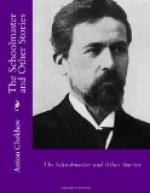What he says is very simple and ordinary, but the midwife for some reason feels flustered. She begins to be afraid of the man and shudders every time she hears his footsteps. In the morning as she is preparing to depart she sees Kiryakov’s little son, a pale, close-cropped schoolboy, in the dining-room drinking his tea. . . . Kiryakov is standing opposite him, saying in his flat, even voice:
“You know how to eat, you must know how to work too. You have just swallowed a mouthful but have not probably reflected that that mouthful costs money and money is obtained by work. You must eat and reflect. . . .”
The midwife looks at the boy’s dull face, and it seems to her as though the very air is heavy, that a little more and the very walls will fall, unable to endure the crushing presence of the peculiar man. Beside herself with terror, and by now feeling a violent hatred for the man, Marya Petrovna gathers up her bundles and hurriedly departs.
Half-way home she remembers that she has forgotten to ask for her three roubles, but after stopping and thinking for a minute, with a wave of her hand, she goes on.
AT THE BARBER’S
MORNING. It is not yet seven o’clock, but Makar Kuzmitch Blyostken’s shop is already open. The barber himself, an unwashed, greasy, but foppishly dressed youth of three and twenty, is busy clearing up; there is really nothing to be cleared away, but he is perspiring with his exertions. In one place he polishes with a rag, in another he scrapes with his finger or catches a bug and brushes it off the wall.
The barber’s shop is small, narrow, and unclean. The log walls are hung with paper suggestive of a cabman’s faded shirt. Between the two dingy, perspiring windows there is a thin, creaking, rickety door, above it, green from the damp, a bell which trembles and gives a sickly ring of itself without provocation. Glance into the looking-glass which hangs on one of the walls, and it distorts your countenance in all directions in the most merciless way! The shaving and haircutting is done before this looking-glass. On the little table, as greasy and unwashed as Makar Kuzmitch himself, there is everything: combs, scissors, razors, a ha’porth of wax for the moustache, a ha’porth of powder, a ha’porth of much watered eau de Cologne, and indeed the whole barber’s shop is not worth more than fifteen kopecks.
There is a squeaking sound from the invalid bell and an elderly man in a tanned sheepskin and high felt over-boots walks into the shop. His head and neck are wrapped in a woman’s shawl.
This is Erast Ivanitch Yagodov, Makar Kuzmitch’s godfather. At one time he served as a watchman in the Consistory, now he lives near the Red Pond and works as a locksmith.
“Makarushka, good-day, dear boy!” he says to Makar Kuzmitch, who is absorbed in tidying up.
They kiss each other. Yagodov drags his shawl off his head, crosses himself, and sits down.




